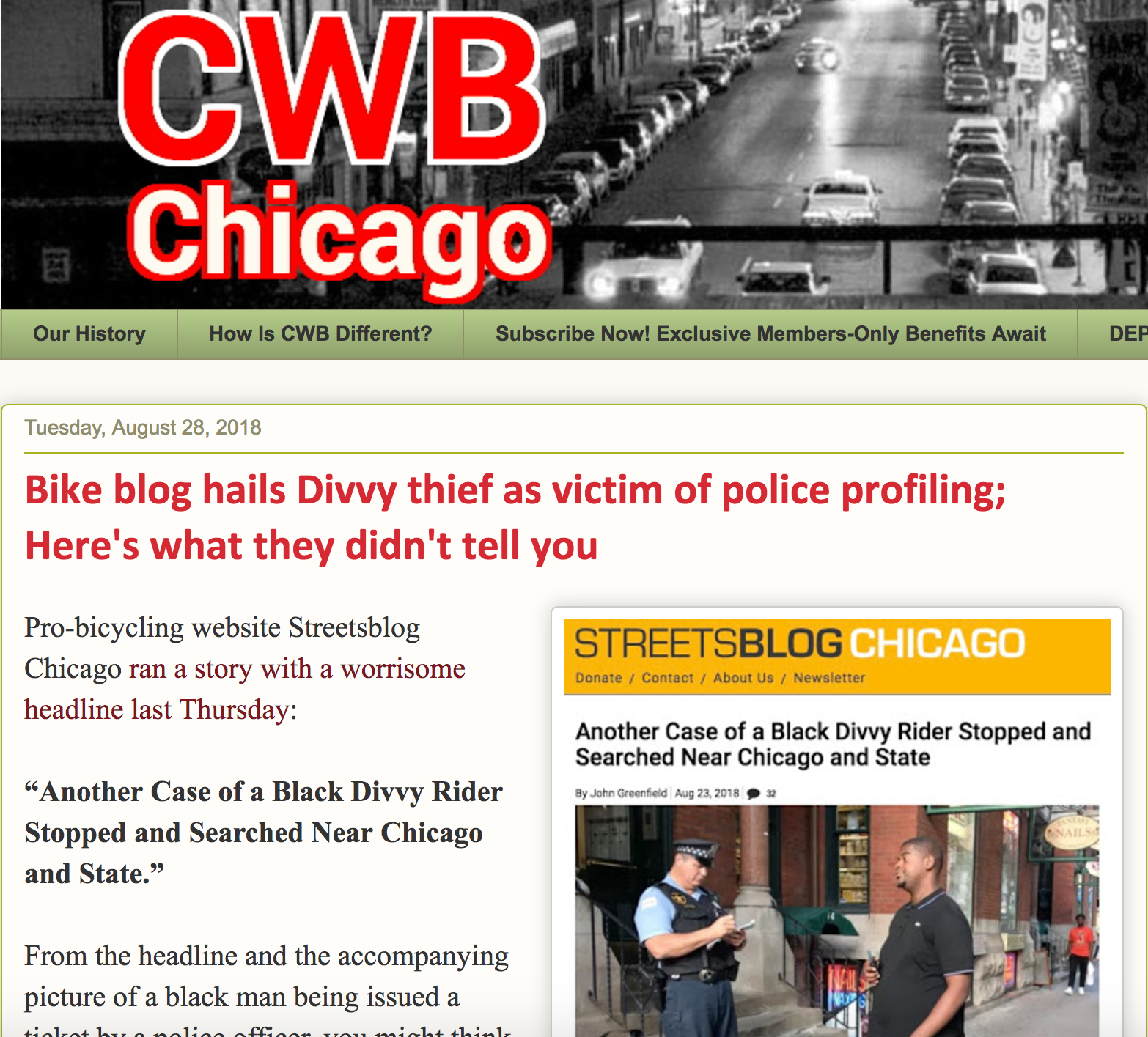First of all, a mea culpa on my part. It was poor judgment of me to exchange info about the recent wave of Divvy thefts and arrests with a writer from the anonymous crime blog CWB Chicago. The site seems to get its facts straight while chronicling North Side public safety issues, and its coverage of bike-share-related arrests has shed light on the magnitude of the theft problem. But it's a fundamentally problematic publication because we have no idea who's writing it. For example, the author or authors claim to have no direct ties to the Chicago Police Department, but there's no immediate way to verify that.
At any rate, I feel compelled to respond to today's CWB's post trashing Streetsblog Chicago's coverage of the Hakeem Appling Divvy arrest. When I was writing the article, I discussed the case with the CWB reporter. They mentioned that Appling, a 24-year-old African-American resident of Old Town, was known to local police a "troublemaker." I didn't feel the need to follow up for more info on that label, since it was coming from an anonymous blogger from a pro-police website. (Not that Streetsblog Chicago is anti-police. For starters, sustainable transportation advocates respect that officers can help create safer streets through fair and effective traffic enforcement, and we appreciate their role as first responders to crashes.)
After our article came out, the CWB writer contacted me with a reminder that police consider Appling to be a "troublemaker," so I asked if there was specific illegal behavior the officers could point to. The blogger mentioned that Appling was previously arrested for threatening a McDonald's manager, as well as two other arrests for possession of moderate amounts of marijuana. I updated the Streetsblog post with that info.
I'll give the CWB writer the benefit of the doubt and assume they did a deeper dive into Appling's history after our last exchange, rather than intentionally withholding info from me, because today's CWB post mentions several other arrests, including additional run-ins with the McDonald's manager. The blogger has a valid point that Appling's record, and the officers' knowledge of it, are relevant to his Divvy stop. If the police saw Appling illegally riding a Divvy on the sidewalk and chose to arrest him, given his record he wasn't necessarily singled out due to his race, even though it appears that the many white folks who ride Divvies on downtown sidewalks are rarely pulled over, let alone handcuffed and searched like Appling was.
But the CWB writer left a key detail out of their post, even though, when they warned me they planned to write something, I recommended that they include it. That is, Appling probably wasn't riding on the sidewalk illegally. Appling told me that he was straddling the Divvy on the sidewalk looking at his phone when an officer ordered him to get off the sidewalk. He said he rode directly to the the street, at which point another officer handcuffed him.
Although Appling was cited for violating the city's sidewalk biking ordinance, the code states “A person 12 or more years of age may ride a bicycle upon any sidewalk in any district, but only if such sidewalk has been officially designated and marked as a bicycle route, or such sidewalk is used to enter the nearest roadway, intersection [emphasis added] or designated bicycle path, or to access a bicycle share station." Appling wasn't aware of this exception to the law before I told him about it (the police probably weren't either, though they should have been), so he had no reason to lie to me about his cycling behavior.
So if Appling didn't actually break any traffic laws, given his record and the recent Divvy thefts, were the police still within their rights to stop, cuff, and search him when they saw him on the blue bike? I'm no expert on probable cause, so I consulted someone who is, local civil rights attorney Amanda Yarusso.
"My first impression based on the facts provided is there was no probable cause for the arrest," Yarusso said. "A past record can't be probable cause for an arrest unless there's an outstanding warrant. There was reasonable suspicion to do a brief Terry stop to investigate [whether the Divvy was stolen], which typically cannot involve handcuffing, but could allow for running the bike info."
As such, assuming Appling told me the truth about how the arrest went down (and, again, he had no reason to make that up) the police likely had no right to handcuff him. Therefore the search that identified the Divvy as stolen may well have been invalid.
So shame on CWB for omitting that detail. But shame on me for trying to collaborate with a nameless, faceless crime blogger.
Update 8/29/18, 3:30 PM: I believe there has been sufficient back-and-forth about the Appling case, and moderating and responding to the many comments has been time-consuming, so I've closed the comments section for this post. Streetsblog Chicago will continue to provide updates on the policing of Divvy riders and the larger issue of equitable bike enforcement.





